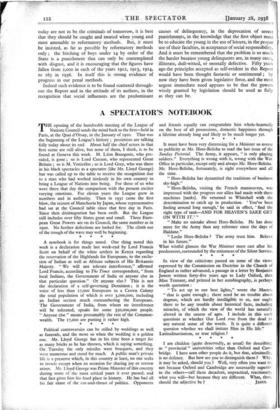A SPECTATOR'S NOTEBOOK
THE opening of the hundredth meeting of the League of Nations Council sends the mind back to the first—held in Paris, at the Quai d'Orsay, in the January of 1920. That was the beginning of the League's history ; pessimists are talking folly today about its end. About half the chief actors in that first scene are still alive, but none of them, I think, is to be found at Geneva this week. M. Leon Bourgeois, who pre- sided, is gone ; so is Lord Curzon, who represented Great Britain ; so is M. Venizelos ; so is Lord Grey, who was there in his black spectacles as a spectator (like Mr. Lloyd George) but was called up to the table to receive the recognition due to a man who had worked tirelessly in his own country to bring a League of Nations into being. For those of us who were there that day the comparison with the present excites varying emotions. For eleven years the League grew in numbers and in authority. Then in 1931 came the first blow, the seizure of Manchuria by Japan, whose representative had sat at the Council table since that first day in Paris. Since then disintegration has been swift. But the League still includes over fifty States great and small. Three Euro- pean Great Powers are on its Council, the same number as in 1920. No further defections are looked for. The climb out of the trough of the wave may well be beginning.


















































 Previous page
Previous page